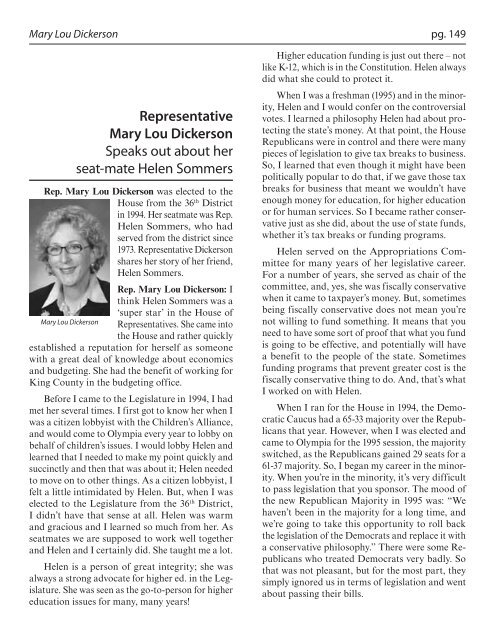Helen Sommers: An Oral History
Helen Sommers: An Oral History
Helen Sommers: An Oral History
You also want an ePaper? Increase the reach of your titles
YUMPU automatically turns print PDFs into web optimized ePapers that Google loves.
Mary Lou Dickerson<br />
representative<br />
mary lou dickerson<br />
Speaks out about her<br />
seat-mate <strong>Helen</strong> <strong>Sommers</strong><br />
Rep . Mary Lou Dickerson was elected to the<br />
House from the 36th District<br />
in 1994. Her seatmate was Rep.<br />
<strong>Helen</strong> <strong>Sommers</strong>, who had<br />
served from the district since<br />
1973. Representative Dickerson<br />
shares her story of her friend,<br />
<strong>Helen</strong> <strong>Sommers</strong>.<br />
Rep . Mary Lou Dickerson: I<br />
think <strong>Helen</strong> <strong>Sommers</strong> was a<br />
‘super star’ in the House of<br />
Mary Lou Dickerson<br />
Representatives. She came into<br />
the House and rather quickly<br />
established a reputation for herself as someone<br />
with a great deal of knowledge about economics<br />
and budgeting. She had the benefit of working for<br />
King County in the budgeting office.<br />
Before I came to the Legislature in 1994, I had<br />
met her several times. I first got to know her when I<br />
was a citizen lobbyist with the Children’s Alliance,<br />
and would come to Olympia every year to lobby on<br />
behalf of children’s issues. I would lobby <strong>Helen</strong> and<br />
learned that I needed to make my point quickly and<br />
succinctly and then that was about it; <strong>Helen</strong> needed<br />
to move on to other things. As a citizen lobbyist, I<br />
felt a little intimidated by <strong>Helen</strong>. But, when I was<br />
elected to the Legislature from the 36 th District,<br />
I didn’t have that sense at all. <strong>Helen</strong> was warm<br />
and gracious and I learned so much from her. As<br />
seatmates we are supposed to work well together<br />
and <strong>Helen</strong> and I certainly did. She taught me a lot.<br />
<strong>Helen</strong> is a person of great integrity; she was<br />
always a strong advocate for higher ed. in the Legislature.<br />
She was seen as the go-to-person for higher<br />
education issues for many, many years!<br />
pg. 149<br />
Higher education funding is just out there – not<br />
like K-12, which is in the Constitution. <strong>Helen</strong> always<br />
did what she could to protect it.<br />
When I was a freshman (1995) and in the minority,<br />
<strong>Helen</strong> and I would confer on the controversial<br />
votes. I learned a philosophy <strong>Helen</strong> had about protecting<br />
the state’s money. At that point, the House<br />
Republicans were in control and there were many<br />
pieces of legislation to give tax breaks to business.<br />
So, I learned that even though it might have been<br />
politically popular to do that, if we gave those tax<br />
breaks for business that meant we wouldn’t have<br />
enough money for education, for higher education<br />
or for human services. So I became rather conservative<br />
just as she did, about the use of state funds,<br />
whether it’s tax breaks or funding programs.<br />
<strong>Helen</strong> served on the Appropriations Committee<br />
for many years of her legislative career.<br />
For a number of years, she served as chair of the<br />
committee, and, yes, she was fiscally conservative<br />
when it came to taxpayer’s money. But, sometimes<br />
being fiscally conservative does not mean you’re<br />
not willing to fund something. It means that you<br />
need to have some sort of proof that what you fund<br />
is going to be effective, and potentially will have<br />
a benefit to the people of the state. Sometimes<br />
funding programs that prevent greater cost is the<br />
fiscally conservative thing to do. <strong>An</strong>d, that’s what<br />
I worked on with <strong>Helen</strong>.<br />
When I ran for the House in 1994, the Democratic<br />
Caucus had a 65-33 majority over the Republicans<br />
that year. However, when I was elected and<br />
came to Olympia for the 1995 session, the majority<br />
switched, as the Republicans gained 29 seats for a<br />
61-37 majority. So, I began my career in the minority.<br />
When you’re in the minority, it’s very difficult<br />
to pass legislation that you sponsor. The mood of<br />
the new Republican Majority in 1995 was: “We<br />
haven’t been in the majority for a long time, and<br />
we’re going to take this opportunity to roll back<br />
the legislation of the Democrats and replace it with<br />
a conservative philosophy.” There were some Republicans<br />
who treated Democrats very badly. So<br />
that was not pleasant, but for the most part, they<br />
simply ignored us in terms of legislation and went<br />
about passing their bills.
















